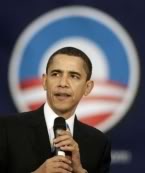
It's probably not a wise thing to utter such opinion next to Truth. If you've listened through the link you'll know that the heckler christens Barack Obama the anti-christ. Now scripture encourages us to be on the look out for the anti-christ - and for those that would come before the True Christ in messiah-like fashion. It even suggests that there will be One who eventually claims to be God. I have to admit that I have wondered about this President. I've kept a quiet mouth on the idea - but an open eye and mind to the possibility. Anyone remember the photo to the right? Or these? How about Oprah Winfrey's pronunciation of him as "The One". Yikes. I've watched him(seemingly) cater to Muslims here, here and arguably suggest that all religions are Truth. And admittedly, the deep policy differences that I hold with the President - particularly as it relates to abortion rights and social engineering on behalf of the gay agenda - led me to a knee jerk first thought, "...even the demons believe in God..." (James 2:19)
At the same time I've seen him profess a stirring and profound Christian testimony about coming to Christ. The contradictions are too numerous to number in this space. So this reminds me that throughout history the Christian public, including me, have speculated - and the contradictions existed - in the same way about other leaders. Some thought Stalin was the anti-christ. Some thought Hitler the anti-christ. In my lifetime I can remember wondering about Gorbachev. (remember that sinister mark?) How about Amadinajad. I have to admit that I even wondered about possibility of Clinton or the Bush family dynasty springing forth the one who is anti-God. (We still have Jeb - and ALL grandkids kids.) So it should be no surprise - and I would argue is a biblical mandate - that I should view any world leader that comes to the world stage as a conquering hero - to be a candidate. Of course, we think these things knowing that most scholars believe the anti-christ will rise from eastern europe or the middle east. So perhaps the President's response shouldn't surprise us and even may give those of us watching and in political disagreement something he's always promised: Hope. (he's certainly given us plenty of change).



